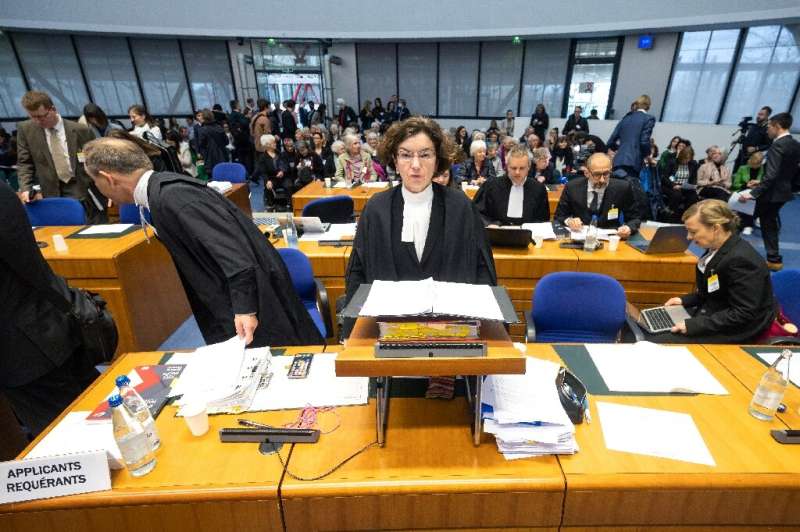Europe rights court hears climate cases against governments

Cases opened Wednesday before the European Court of Human Rights against France and Switzerland over alleged failings to protect the environment, marking the first time governments are in the court’s dock for alleged climate change inaction.
The case against Switzerland is based on a complaint by an association of elderly people—who call themselves the “Club of Climate Seniors”—concerned with the consequences of global warming on their living conditions and health, the ECHR said.
They accuse the Swiss authorities of various climate change failings which they say amount to a violation of the government’s obligation to protect life and citizens’ homes and families.
“We’ve been fighting for years,” said Bruna Molinari, 81, who lives in the southern Tessin canton “where the pollution is the worst”.
“I hope the court will find in our favor so that Switzerland does better than it has done so far,” he added ahead of the hearing.
The average age is 73 in the Swiss club, which is backed by Greenpeace Switzerland.
Around 50 of its 2,000 members were expected in Strasbourg for the hearing.
‘Heat kills’
Alain Chablais, representing the Swiss government, told the court that it was “baseless to claim or suggest that Switzerland is doing nothing”.
The ECHR “has no business becoming the place where national climate protection policy is decided,” he added.
But the plaintiffs’ lawyer Jessica Simor said her clients were “already suffering the effects of climate change” that Switzerland was not doing enough to stop.
Temperatures were rising “twice as quickly” in the Alpine nation as the global average, she added.
“Heat kills… increasing the risks of kidney problems, asthma attacks, cardiovascular difficulties… and causes particularly acute symptoms in elderly people, more especially elderly women”.
The case against France was brought by Damien Careme, a former mayor of Grande-Synthe, a suburb of Dunkirk in northern France, who also argues that the central government has failed to meet its obligation to protect life by taking insufficient steps to prevent climate change.
When he was mayor, Careme brought his case to the French judiciary on behalf of his town but also on his own behalf, saying climate change was raising the risk of his home being flooded.
France’s highest administrative court ruled in favor of the town against the central government in 2021, but threw out the individual case brought by Careme, which he then took to the ECHR.
‘Extremely high stakes’
“The stakes are extremely high,” said Corinne Lepage, a former French ecology minister and one of Careme’s lawyers in the case.
“If the European court recognizes that climate failings violate the rights of individuals to life and a normal family life, then that becomes precedent in all of the council’s member states and potentially in the whole world,” she told AFP.
The European Court of Human Rights—whose members are the 46 states belonging to the Council of Europe—acknowledged in a statement ahead of the hearings that the European Convention on Human Rights, on which it must base its judgements, does not actually include a right to a healthy environment.
But its decision to take Wednesday’s cases was based on the fact that the exercise of the convention’s existing rights could be undermined by harm to the environment or exposure to environmental risks.
A third pending case, without a date for a hearing so far, was brought by young Portuguese applicants claiming that climate inaction by dozens of states had contributed to heatwaves in Portugal which they said was affecting their rights.
Although the cases are a first for the ECHR, governments have in the past been taken to court in their national jurisdictions.
In 2019, the Dutch Supreme Court ordered the government to cut greenhouse gas emissions following a complaint by an environmental organization.
Two years later, a court in Paris found the French government guilty of climate inaction and ordered it to pay for resulting damages after four NGOs filed a case.
Wednesday’s hearings are only the start of proceedings that are likely to take several months before the court hands down its verdicts.
© 2023 AFP
Citation:
Europe rights court hears climate cases against governments (2023, March 29)
retrieved 29 March 2023
from https://phys.org/news/2023-03-europe-rights-court-climate-cases.html
This document is subject to copyright. Apart from any fair dealing for the purpose of private study or research, no
part may be reproduced without the written permission. The content is provided for information purposes only.
For all the latest Science News Click Here
For the latest news and updates, follow us on Google News.

